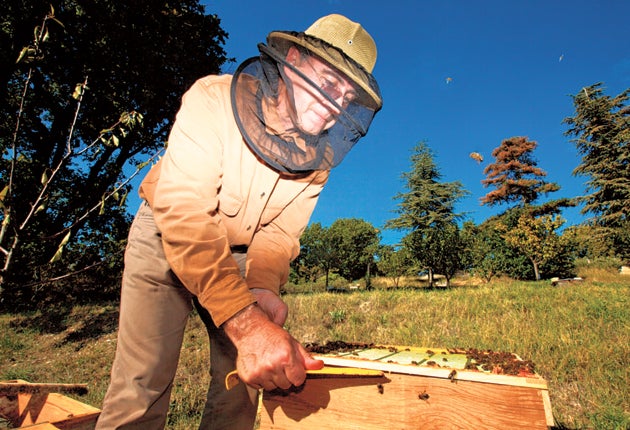Stripe-suited workers create a new buzz at stock exchange

The London Stock Exchange is to welcome thousands of new worker drones next month, by introducing bees to its rooftop in the City.
Europe's largest stock exchange, the fourth biggest in the world, has taken delivery of two beehives which will receive their 100,000 residents in a fortnight .
It is a step that will strike many as eccentric, both in the City and outside, but the Exchange's chief executive Xavier Rolet, an avid beekeeper, is excited about the move, which he says is a small effort to address the threat to Europe's dwindling bee populations. The honey will be given as corporate gifts.
Honey bee numbers across Europe and North America have been falling in recent years, raising concerns for their future. It is hoped that the LSE's warmer central London location, overlooking St Paul's, will help its new colonies survive the winter.
According to the London Beekeepers Association: "Urban bees have a wide range of forage, as the gardens and green spaces in cities contain a rich variety of trees and flowers. This, and the slightly milder weather, means that the beekeeping season is longer and usually more productive than in rural areas."
With concern mounting over bee populations, the number of hobbyist beekeepers is on the rise, and the LSE is only the latest business organisation to install apiaries on its premises. Mr Rolet, 51, keeps 50,000 bees at his private estate in Provence. The former Bank of England governor Robin Leigh-Pemberton and the Business Secretary Vince Cable are beekeeping enthusiasts, and the Japanese investment bank Nomura has installed two hives at its London site.
Like the new LSE project, Nomura's apiary was set up in partnership with a not-for-profit social enterprise, The Golden Company, and offers underprivileged young people the opportunity to help sustain the hives and learn business skills.
The Exchange hopes that employees will get involved. A spokesman said: "Local people and communities, including underprivileged children, will be able to help look after the hives, and employees will also have the chance to help."
Natural remedy
* Honey has been used for centuries to treat everything from sore throats to cuts, burns and digestive problems and can help against seasonal conditions such as hay fever.
* Locally produced honey, as the kind one might find at an open-air market, has the added benefit of carrying traces of pollen from the area. It is thought these spores and pollens can help build an immunity or tolerance to the toxins which cause hay fever.
* The Urban Honey Collective ( www.urbanhoneycollective.co.uk) keeps a database of beekeepers by area to help honey-lovers to find honeys close to home.
* It is also worth remembering that when exposed to temperatures of around 50C (122F) or more, the enzymes in honey are destroyed – and with them, any beneficial effects. So if putting honey in a hot beverage is your thing, remember to let the drink cool a little first.
Join our commenting forum
Join thought-provoking conversations, follow other Independent readers and see their replies
Comments
Bookmark popover
Removed from bookmarks